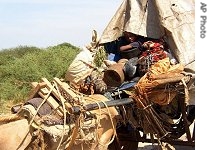2006年VOA标准英语-Humanitarian Crisis Triggered by Somalia Fighti(在线收听)
By Cathy Majtenyi
Nairobi
28 December 2006
Aid agencies say recent fighting in Somalia has taken a humanitarian toll. Hundreds of people have been wounded, thousands have fled their homes and tens of thousands are cut off from food relief they have relied on since the country's recent floods. Cathy Majtenyi reports for VOA from Nairobi.
The International Committee of the Red Cross says medical facilities near the front lines of battles in central and southern Somalia have admitted more than 800 people wounded during the fighting.
The agency's medical coordinator Somalia, Oscar Avogadri, describes to VOA some of the most common injuries sustained as a result of what the agency considers "the worst fighting in a decade."
He said, "They had fighting in open fields - so they should have gunshot wounds - and eventually shelling, because we know they have used mortars, etc."
"Most of the wounded are wounded in the limbs, because usually this is the pattern. Some of them have abdominal or chest wounds. They are [being] treated in the different hospitals," he added.
 |
| A Somali family takes a ride on a donkey cart near Buur to escape fighting, 24 Dec 2006 |
The latest round of fighting between Ethiopian-backed Somali government troops and fighters loyal to the Islamic Courts Union, which took control of much of Somalia earlier this year, flared last week.
Much of the fighting was concentrated on several fronts near the town of Baidoa, the base of the internationally backed transitional government.
As a result of the conflict, the World Food Program Tuesday suspended its helicopter deliveries of food aid to communities near the port city of Kismayo that had been hit hard by recent flooding.
World Food Program spokesman Peter Smerdon says the war has made a bad situation worse.
He said, "This comes on top of the worst floods in many years that have affected nearly half a million people, which themselves were preceded by the worst drought in 10 years."
"So, these people have been exhausted by the droughts and floods, and, now, the conflict and general tensions are stopping them from receiving the humanitarian assistance that they so badly need," he continued.
Smerdon says airdrops of food have also been suspended, and the fighting has disrupted some road deliveries. About 25 humanitarian workers have been re-located from Kismayo to Kenya's capital, Nairobi.
The agency airdropped 28 metric tons of food into the flooded areas on Christmas Eve and Christmas Day.
Smerdon explains that the World Food Program was set to deliver 1,000 metric tons of food aid to about 50,000 in the flooded areas over the next few weeks when the flights were suspended.
Earlier this year, the Islamic Courts Union seized control of the capital and much of the rest of the country before reaching a truce with the government.
The two sides signed a peace accord in September, but negotiations meant to finalize the accord collapsed in Sudan on November second.
In the recent fighting, the Islamists have fled the capital before advancing Ethiopian-backed government troops.